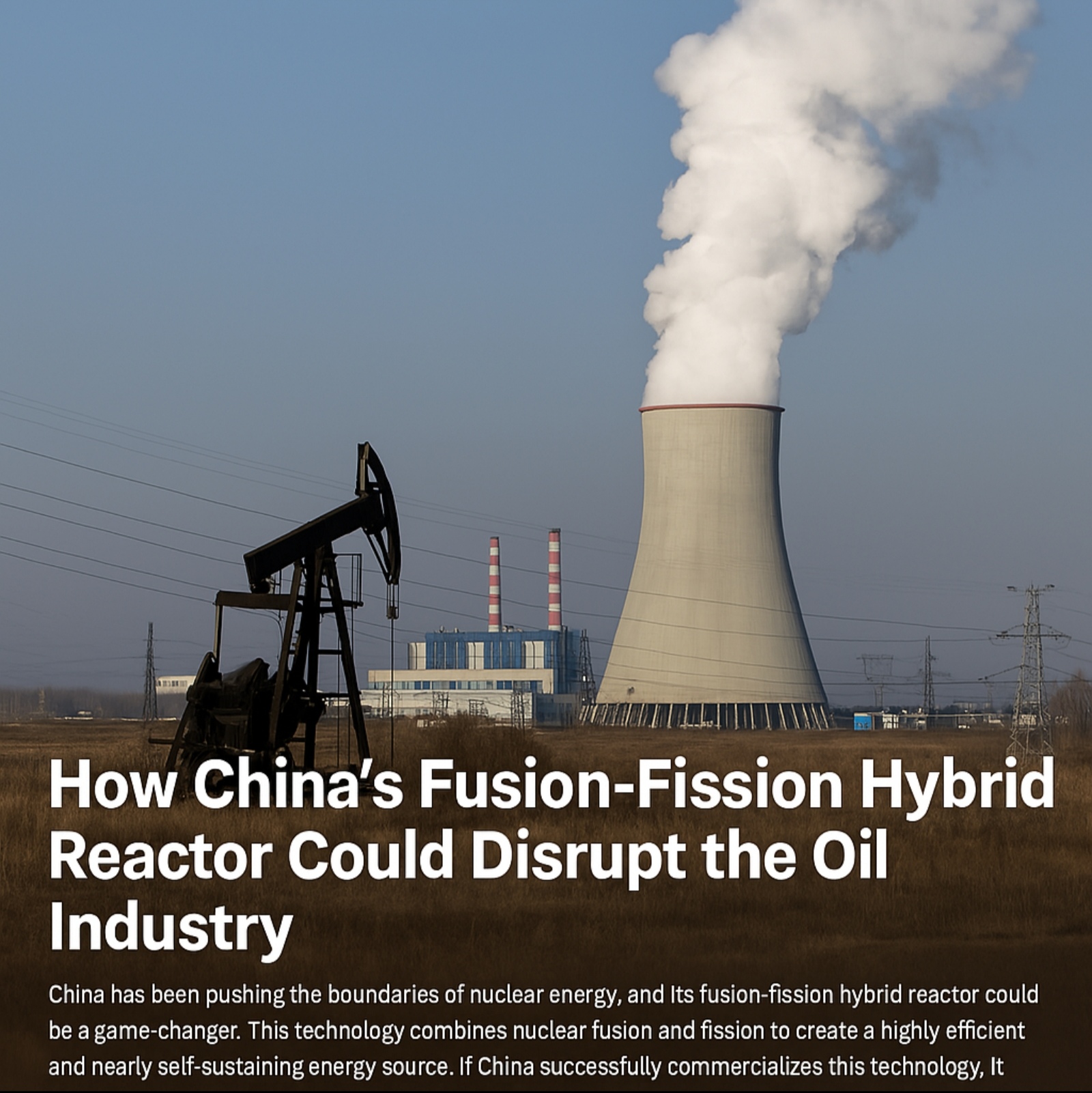China has been pushing the boundaries of nuclear energy, and its fusion-fission hybrid reactor could be a game-changer. This technology combines nuclear fusion and fission to create a highly efficient and nearly self-sustaining energy source. If China successfully commercializes this technology, it could have massive implications for global energy markets, particularly the oil industry.

1. Disrupting the Oil Industry Economically
The oil industry is a multi-trillion-dollar global enterprise that powers everything from transportation to electricity generation. Any alternative energy source that provides cheaper, cleaner, and more abundant power has the potential to disrupt this market. Here’s how:
- Cheaper Energy Production: Fusion-fission hybrids could provide a virtually limitless supply of energy at a much lower long-term cost compared to fossil fuels. Oil companies rely on high demand and price stability, but if fusion-fission power scales up, electricity generation will no longer depend on expensive fossil fuels.
- Reduction in Oil Demand: The largest consumers of oil are transportation (cars, trucks, ships, and airplanes) and electricity generation (especially in regions still reliant on oil-fired power plants). If fusion-fission technology enables mass electrification at lower costs, countries will shift away from oil.
- Energy Independence: Many nations depend on oil imports, making them vulnerable to geopolitical tensions and price fluctuations. A successful fusion-fission reactor would enable nations to generate their own energy, reducing their reliance on oil-exporting countries and diminishing the power of OPEC.
- Long-Term Decline of Oil Prices: If fusion-fission reactors become commercially viable, global demand for oil could shrink, driving prices down. Countries like Saudi Arabia, Russia, and even the U.S. (which relies heavily on fracking) could see declining revenues, forcing them to diversify their economies or risk financial instability.
2. The Shift Toward Clean Energy
While the oil industry stands to lose, the world gains from the advancement of fusion-fission technology in terms of clean energy and sustainability.
- Virtually No Greenhouse Gas Emissions: Unlike coal, oil, or natural gas, fusion-fission reactors produce minimal greenhouse gases, making them an ideal solution for combating climate change.
- Reduction in Air Pollution: Burning fossil fuels releases pollutants that contribute to respiratory diseases and environmental degradation. A shift to fusion-fission energy could lead to cleaner air and improved public health worldwide.
- Less Radioactive Waste Compared to Traditional Nuclear Fission: While nuclear fission reactors produce highly radioactive waste that lasts for thousands of years, fusion-fission hybrids generate far less long-term waste, making nuclear power safer and more sustainable.
- High Energy Output and Efficiency: Fusion-fission technology could generate significantly more power than conventional fossil fuels or renewables, ensuring a stable and reliable energy supply that can support industrial growth and urbanization without the drawbacks of traditional power sources.
3. The Role of China and the Geopolitical Energy Shift
China’s leadership in nuclear innovation is significant. If China perfects fusion-fission reactors before the rest of the world, it could gain a major competitive edge in the global energy market:
- Exporting Advanced Energy Technology: China could sell its fusion-fission reactor technology to other countries, reducing their dependence on Western energy firms and fossil fuel-based power grids.
- Strategic Energy Independence: As the world’s largest energy consumer, China is aggressively moving to secure future energy independence. By pioneering fusion-fission technology, China could reduce its reliance on imported oil and gas, particularly from the Middle East and Russia.
- Undermining U.S. and Western Energy Dominance: The U.S. and its allies have historically dominated global energy markets, but China’s advancements in nuclear fusion could shift that balance, allowing Beijing to dictate future energy policies and influence global energy prices.
A Paradigm Shift in Global Energy Markets
China’s fusion-fission hybrid reactor has the potential to be one of the most disruptive technological breakthroughs in energy history. If successful, it could significantly reduce global oil demand, lower energy costs, and accelerate the shift toward clean energy. While this is a positive step for the environment, public health, and energy security, it poses a major economic threat to oil-producing nations and industries that rely on fossil fuel profits.
For oil companies, the writing is on the wall: Adapt or face decline. For the rest of the world, this could mark the beginning of a new energy era—one where clean, limitless power is no longer a dream but a reality.